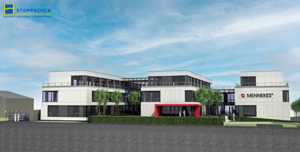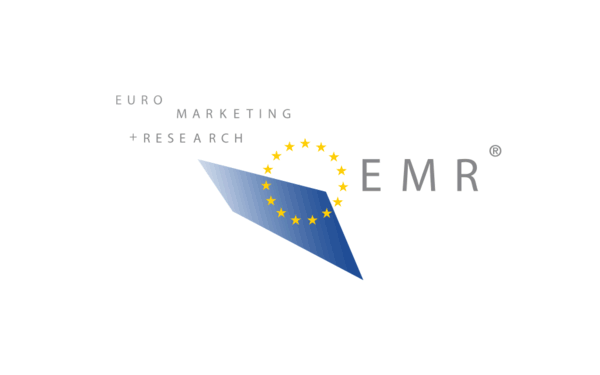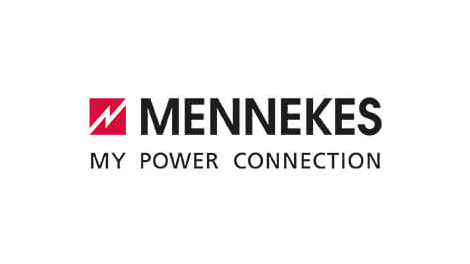Mennekes – MENNEKES erects a new administration building in Kirchhundem-Welschen Ennest
 Space for 110 employees and a focus on sustainable construction
Space for 110 employees and a focus on sustainable construction
The excavators are rolling again at the MENNEKES Group: At the Kirchhundem-Welschen Ennest site, the electrical engineering specialist is constructing a new building for administration. Construction has started recently and completion is scheduled for spring 2024. The total construction costs amount to around 7 million euros. 110 new office jobs are created.
Building number three is now being built on Kölner Straße, where MENNEKES has had its logistics center since 2013 and where two modern administration buildings including a customer center and cafeteria were built in 2019. “M10.3.” completes the previous two administration buildings “M10.1” and “M10.2”. The new building has three floors plus a basement and is 2,500 square meters.
In the construction of “M10.3”, a special focus is on sustainable, i.e. resource and environmentally friendly construction according to the criteria of the German Sustainable Building Council (DGNB). The construction takes place in wood-concrete composite construction and all building materials used are tested according to the DGNB specifications – so that the construction measure leaves the smallest possible CO2 footprint and the finished building can have a healthy indoor climate for decades.
The energy management of the building is also geared to sustainability from the outset: like the previous administration building in Welschen Ennest, the new building is also to be heated with the waste heat generated in the nearby production building. This is made possible by a sophisticated system with two large underground water storage tanks and a local heating network. Issues such as accessibility and variable use are also taken into account when constructing the building.
With the new administration building, MENNEKES is creating additional office space for the employees of its electromobility division and its central service departments. The previous administration building in Welschen Ennest already houses the IT department and MENNEKES Stecker GmbH und Co. KG, which, as part of the group of companies, makes specific charging cables and charging inlets for the automotive industry – the sockets behind the tank flaps of electric vehicles – developed and produced.
Christopher Mennekes, Managing Partner of MENNEKES, on the construction project: “Thanks to our solid industrial business, the growth of the e-mobility market and forward-looking management, our company is doing well despite the current challenges and global crises. We are therefore in the comfortable position of being able to further expand our site in Welschen Ennest and are deliberately placing a strong focus on the topic of sustainable construction.”
The construction project is planned and managed by the Stoppach engineering company, with which MENNEKES has been working in a spirit of trust for many years.
Source
MENNEKES
EMR Analysis
More information on MENNEKES: See the full profile on EMR Executive Services
More information on Walter Mennekes (Chief Executive Officer, MENNEKES): See the full profile on EMR Executive Services
More information on Christopher Mennekes (Chief Executive Officer, MENNEKES): See the full profile on EMR Executive Services
More information on the German Sustainable Building Council (DGNB): https://www.dgnb.de/en/index.php + DGNB – the abbreviation (in German) for the German Sustainable Building Council. A non-profit organisation based in Stuttgart, ever since it was founded in 2007 the DGNB has been committed to demonstrably good buildings and urban districts that are worth living in. In straightforward terms, this means building an environment around ourselves with foresight. Our overarching aim is to promote change in the building and property market, engendering an appropriate understanding of quality as a foundation for responsible and sustainable action.
The DGNB promotes sustainable building in a variety of ways, not only in Germany but also in the rest of the world.
The conceptual principles of the DGNB revolve around a holistic understanding of sustainability, encompassing environmental, economic and sociocultural factors. So our vision is just as much about the environment as it is about economic viability and people. As a consequence, for the DGNB sustainability is synonymous with quality and future viability.
More information on DGNB Certification: https://www.dgnb.de/en/council/certification/index.php + To make sustainable building applicable on a practical level, measurable and thus comparable, the DGNB has developed its own certification system. This system offers a variety of options for buildings, indoor environments and districts – not only for new buildings but also for existing ones. The DGNB System works like a planning and optimisation tool, providing help with raising the tangible sustainability of building projects. It also fosters a shared understanding of the pertinent requirements of sustainable building methods, among all parties involved in development projects. Certification should make an essential contribution to quality across the board in planning, construction and actual use. By reducing risk and the costs associated with it, applying the DGNB System helps tailor building projects to needs on the horizon. An important part of this is our independent certification process, which adds transparency to quality controls. The DGNB Certificate is granted in Platinum, Gold or Silver, so it can also be used as an award and marketing instrument. The DGNB certification system is considered the most advanced system of its kind in the world and is internationally recognised as the global benchmark for sustainability. Applied outside Germany, the DGNB System is adapted to regional requirements. To this end, the DGNB works in close partnership with leading local organisations within individual countries.

